1 May 2019 | China, Journalism Toolbox (Chinese), Magazine, News, Volume 18.08 September 1989
[vc_row][vc_column][vc_custom_heading text=”我们绝食!我们抗议!我们呼吁!我们忏悔!”][/vc_column][/vc_row][vc_row][vc_column][vc_single_image image=”106533″ img_size=”full” add_caption=”yes”][vc_column_text]
我们不是寻找死亡。我们寻找真的生命。
在李鹏政府非理性的军事暴力高压之下,中国知识界必须结束几千年遗传下来的只动口而不动手的软骨症,以行动抗议军管:以行动呼吁一种新的政治文化的诞生;以行动忏悔由于我们长期的软弱所犯下的过失。对于中华民族的落伍,我们人人都负有一份责任。
对于中华民族的落伍,我们人人都负有一份责任。
绝食的目的
此次在中国历史上空前的民主运动,一直採取合法的、非暴力的、理性的和平方式来争取自由、民主和人权,但是,李鹏政府居然以几十万军队来压制手无寸铁的大学生和各界民众。为此,我们绝食,不再是为了请愿,而是为了抗议戒严和军管!我们主张以和平的方式推进中国的民主化进程,反对任何形式的暴力。但是,我们不畏强暴,我们要以和平的方式来显示民间的民主力量的坚韧,以粉碎靠刺刀和谎言来维繫的不民主的秩序!这种对和平请愿的学生和各界民众实行戒严和军管的极端荒谬悖理的蠢举在中华人民共和国的历史上开了一个极为恶劣的先例,使共产党、政府和军队蒙受了巨大的耻辱,将十年改革、开放的成果毁于一旦!
中国几千年的历史,充满了以暴易暴和相互仇恨。及至近代,敌人意识成为中国人的遗传;一九四九年以后的「以阶级斗争为纲」的口号,更把传统的仇恨心理、敌人意识和以暴易暴推向了极端。
此次军管也是「阶级斗争」式的政治文化的体现。为此,我们绝食,呼吁中国人从现在开始逐渐废弃和消除敌人意识和仇恨心理,彻底放弃「阶级斗争」式的政治文化。
因为仇恨只能产生暴力和专制。我们必须以一种民主式的。宽容精神和协作意识来开始中国的民主建设。民主政治是没有敌人和仇恨的政治,只有在相互尊重、相互宽容、相互妥协基础上的协商、讨论和表决。
李鹏作为总理犯有重大失误,应该按照民主程序引咎辞职。但是,李鹏不是我们的敌人,即使他下台,仍然具有一个公民应享有的权利,甚至可以拥有坚持错误主张的权利。我们呼吁,从政府到每一位普通公民,放弃旧的政治文化,开始新政治文化。我们要求政府立即结束军管,并呼吁学生和政府双方重新以和平谈判、协商对话的方式来解决双方的对立。
此次学生运动,获得了空前的全社会各阶层的同情、理解和支持,军管的实施,已把这次学生运动转变为全民的民主运动。但无法否认的是,有很多人对学生的支持是出于人道主义的同情心和对政府的不满,而缺乏一种具有政治责任感的公民意识。为此,我们呼吁,全社会应该逐步地放弃旁观者和单纯的同情态度,建立公民意识。公民意识首先是政治权利平等的意识,每个公民都应该有自信:自己的政治权利与总理是平等的。
其次,公民意识不只是正义感和同情心,更是理性化的参与意识,也就是政治责任感。每个人不只是同情与支持,而且要直接参与民主建设。最后,公民意识是承担责任和义务的自觉性。社会政治合理合法,有每个人的功劳:而社会政治不合理不合法。也有每个人的责任。自觉地参与社会政治和自觉地承担责任,是每个公民的天职。中国人必须明确:在民主化的政治中,每个人首先是公民,其次才是学生、教授、工人、干部、军人等。
几千年来,中国社会是在打倒一个旧皇帝而树立一个新皇帝的恶性循环中度过的。历史证明:某位失去民心的领导人的下台和某位深得民心的领导人的上台并不能解决中国政治的实质性问题。我们需要的不是完美的救世主而是完善的民主制度。
为此,我的呼吁:第一,全社会应该通过各种方式建立起合法的民间自治组织,逐渐形成民间的政治力量对政府决策的制衡。因为民主的精髓是制衡。我们宁要十个相互制衡的魔鬼,也不要一个拥有绝对权力的天使。第二,通过罢免犯有严重失误的领导人,逐步建立起一套完善的罢免制度。谁上台和谁下台并不重要,重要的是怎样上台和怎样下台。非民主程序的任免只能导致独裁。
在此次运动中,政府和学生都有失误。政府的失误主要是在旧的「阶级斗争」式政治思维的支配下,站在广大学生和市民的对立面,致使冲突不断加剧;
学生的失误主要是自身组织的建设太不完善,在争取民主的过程中,出现了大量非民主的因素。因此,我们呼吁,政府和学生双方都要进行冷静的自我反省。我们认为,就整体而言,此次运动中的错误主要在政府方面。游行、绝食等行动是人民表达自己意愿的民主方式,是完全合法合理的,根本就不是动乱。
而政府方面无视宪法赋予每个公民的基本权利,以一种专制政治的思维把此次运动定名为动乱,从而又引出了一连串的错误决策,致使运动一次次升级,对抗愈演愈烈。因而,真正制造动乱的是政府的错误决策,其严重程度不下于“文革”。只是由于学生和市民的克制,社会各界包括党、政、军有识之士的强烈呼吁,才没有出现大规模的流血事件。鉴于此,政府必须承认和反省这些错误,我们认为现在改正还不算太晚。
政府应当从这次大规模的民主运动当中汲取沉痛的教训,学会习惯于倾听人民的声音,习惯于人民用宪法赋予的权利来表达自己的意愿,学会民主地治理国家。全民的民主运动正在教会政府怎样地以民主和法制来治理社会。学生方面的失误主要表现在内部组织的溷乱、缺乏效率和民主程序。诸如,目标是民主的而手段、过程是非民主的;理论是民主的而处理具体问题是非民主的;缺乏合作精神,权力相互抵销,造成决策的零乱状态;财务上的溷乱,物质上的浪费;情感有馀而理性不足;特权意识有馀而平等意识不足;等等。近百年来,中国人民争取民主的斗争,大都停留在意识形态化和口号化的水平上。只讲思想启蒙,不讲实际操作;只讲目标,而不讲手段、过程、程序。我们认为:民主政治的真正实现,是操作的过程、手段和程序的民主化。为此,我们呼吁,中国人应该放弃传统的单纯意识形态化、口号化、目标化的空洞民主,而开始操作的过程、手段和程序的民主建设,把以思想启蒙为中心的民主运动转化为实际操作的民主运动,从每一件具体的事情做起。我们呼吁:学生方面要以整顿天安门广场的学生队伍为中心进行自我反省。
政府在决策方面的重大失误还表现在所谓的「一小撮」的提法上。通过绝食,我们要告诉国内外舆论界,所谓的「一小撮」是这样一类人:他们不是学生,但是他们作为有政治责任感的公民主动地参与了这次以学生为主体的全民民主运动。我们所做的一切都是合理合法的,他们想用自己的智慧和行动让政府从政治文化、人格修养、道义力量等方面知所愧悔,公开承认并改正错误,并使学生的自治组织按照民主和法制程序日益完善。
必须承认,民主地治理国家,对每个中国公民来说都是陌生的,全体中国公民都必须从头学起。包括党和国家的最高领导人。在这个过程中,政府和民众两方面的失误都是不可避免的。关键在于知错必认、知错必改,从错误中学习,把错误转化为积极的财富,在不断地改正错误中逐步地学会民主地治理我们的国家。
二、我们的基本口号
1.我们没有敌人!不要让仇恨和暴力毒化了我们的智慧和中国的民主化进程!
2.我们都需要反省!中国的落伍人人有责!
3.我们首先是公民!
4.我们不是寻找死亡!我们寻找真的生命!
三、绝食的地点、时间、规则
- 地点:天安门广场人民纪念碑下
- 时间:72小时,6月2日16时—6月5日16时。
- 规则:只喝白开水,不得进食、不得饮用含营养物质(糖、淀粉、脂肪、蛋白质)的饮料。
刘晓波 周舵 侯德健 高新
[/vc_column_text][vc_basic_grid post_type=”post” max_items=”4″ element_width=”6″ grid_id=”vc_gid:1556703802152-2a735b4e-99ef-10″ taxonomies=”29029″][/vc_column][/vc_row][vc_row][vc_column width=”1/3″][vc_custom_heading text=”Subscribe”][vc_column_text]In print, online. In your mailbox, on your iPad.
Subscription options from £18 or just £1.49 in the App Store for a digital issue.
Every subscriber helps support Index on Censorship’s projects around the world.
 SUBSCRIBE NOW[/vc_column_text][/vc_column][vc_column width=”1/3″][vc_custom_heading text=”Listen”][vc_column_text]Index on Censorship magazine produces regular podcasts in which we speak to some of the most interesting writers, thinkers and activists around the globe.
SUBSCRIBE NOW[/vc_column_text][/vc_column][vc_column width=”1/3″][vc_custom_heading text=”Listen”][vc_column_text]Index on Censorship magazine produces regular podcasts in which we speak to some of the most interesting writers, thinkers and activists around the globe.
Click here to see what’s in our archive.[/vc_column_text][/vc_column][vc_column width=”1/3″][vc_custom_heading text=”Read”][vc_column_text]Through a range of in-depth reporting, interviews and illustrations, Index on Censorship magazine explores the free speech issues from around the world today.
Explore recent issues here.[/vc_column_text][/vc_column][/vc_row]
23 May 2014 | China, News
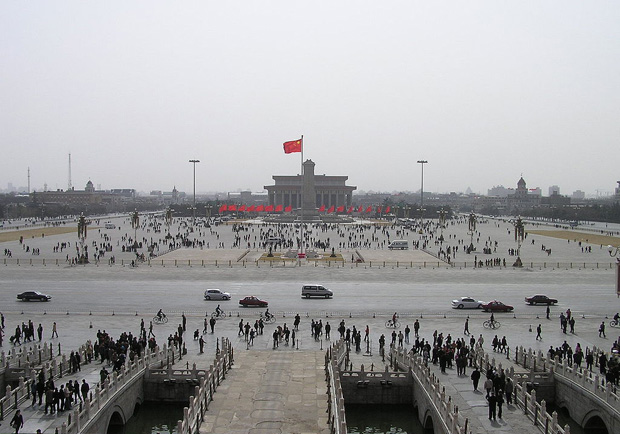
(Photo: Yo Hibino/Wikimedia Commons)
“Keep quiet and carry on” is the slogan that can best describe China’s take on the approaching 25th anniversary of the 1989 Tiananmen Square massacre.
This is the yearly Tiananmen anniversary crackdown, and people within China know what to expect; slower internet, blocked search terms, more military personnel in public and the arrest of high profile individuals. But this year’s crackdown appears particularly thorough, either a reaction to dissent being higher than usual or a perception that it is in light of the milestone anniversary.
The Chinese government has already jailed scores of lawyers, activists and intellectuals, sending a chilling message to any other would-be agitators. Of the most widely reported was the arrest of Pu Zhiqiang, a prominent human rights lawyer who helped organise the 1989 protests. His detention came three days after he joined a private panel discussion on the massacre. Around 15 people were at the event, five of whom have since been detained. Then there was the airing of confessions on state media by journalist Gao Yu and citizen journalist Xiang Nanfu this May, which echoes Maoist propaganda tactics.
As we get closer to 4 June actions against freedom of expression will grow. Yvonne Shen, who is Asia News Digest Editor at Freedom House, an NGO committed to tracking violations to free expression, says the Chinese government “step up their censorship efforts in the days surrounding that date”. Within a week the organisation anticipate spikes in suspicious activity online. They are keeping a close eye on social platform WeChat in particular, given its current popularity.
“There was a leaked document dated 31 May, 2011, from the Beijing Municipal Government, that suggested the authorities had launched a ‘wartime coordination mechanism’ that required all units to report suspicious information during the “sensitive period,” Shen tells Index of the government’s usual tactic.
China forbids open discussion of the Tiananmen Square crackdown, in which soldiers fired on crowds of unarmed pro-democracy protesters, killing hundreds if not thousands (no official death toll has ever been released). On top of arrests, an army of censors work overtime to ensure mentions of the event are quickly removed. Sites are blocked and words that allude to or directly reference it vanish.
The private realms of emails and direct messages are also monitored, as Louisa Lim, author of upcoming book The People’s Republic of Amnesia, Tiananmen Revisited, describes: “I wrote my book on a brand-new laptop that had never been online. Every night I locked it in a safe in my apartment. I never mentioned the book on the phone or in e-mail, at home or in the office — both located in the same Beijing diplomatic compound, which I assumed was bugged.”
Chinese journalists are trained “not to ever touch Tiananmen with a 10 foot pole,” Beijing-based journalist Eric Fish tells Index. He too perceives a recent shift: “The atmosphere for Chinese journalists has tightened quite a bit in general since Xi Jinping came to power. It feels like they’ve clamped down a lot more than normal in the lead-up to this anniversary.”
As Fish says, the detentions form part of a broader crackdown on free speech. When Xi Jinping came to power in 2012, there were hopes he would relax censorship. These hopes were quickly dashed. Index recently reported on a ban of seemingly innocent US TV shows, which shows just how pervasive the attack has been.
Even foreign journalists, who are usually granted more leeway, have experienced “a big uptick in pressure over the past two years,” says Fish, a reference to several prominent cases of journalist visas being revoked.
This is a fact Steven Levine has had to accept. “I anticipate being refused a Chinese visa the next time I apply to visit China as this is one way in which the Chinese authorities punish foreigners who criticise their human rights practices,” explains the retired professor of Chinese history and politics, who coordinates the Tiananmen Initiative Project — an individual effort aimed at focussing attention on the Tiananmen Movement and government crackdown.
Levine’s project has already been banned from the Chinese online world; within days of launching last November, the site had been blocked. Levine will not be deterred and continues to correspond with Chinese individuals inside the country, as well as with exiled Chinese who were either leaders or active in the 1989 movement. For him, being refused a visa is a price worth paying. It’s a different story for those inside of China, who take a much bigger gamble.
That said many have come up with creative ways to circumvent censorship. For example, prominent writer Murong Xuecun avoided the censors by using the politically neutral word “tractors” instead of the highly provocative “tanks”. And while “4th June” is blocked, the new code of “May 35th” has filled its place — a count of that month’s 31 days plus four in June.
It’s a game of cat and mouse. Ultimately, the cat is winning, but the mice aren’t going down without a fight.
This article was posted on May 23, 2014 at indexoncensorship.org
7 May 2014 | Asia and Pacific, China, News
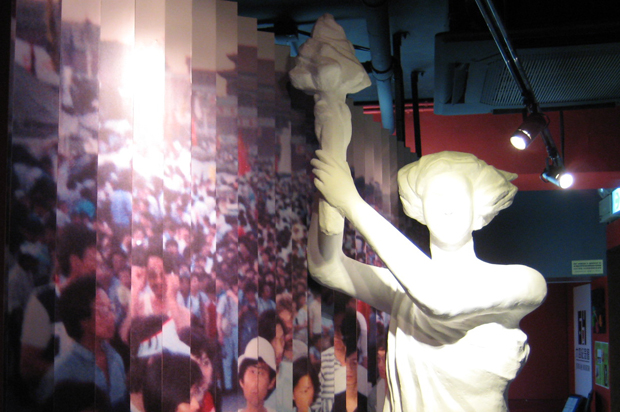
(Photo: Hannah Leung)
The world’s first museum dedicated to the 1989 pro-democracy protests in Beijing’s Tiananmen Square opened in Hong Kong last Saturday to mark the 25 year anniversary. Named the June 4 Memorial Museum, it hopes to educate the millions of mainland tourists who visit Hong Kong each year.
The violent suppression of student protests in Tiananmen Square remains a taboo topic in mainland China, banned from official discourse. Beijing considers the weeks of peaceful protest by students and workers a “counter-revolutionary” revolt and defends its decision to send in the army. To this day no official numbers of the death toll have been released and many young Chinese in particular are unaware of its occurrence.
Index visited the museum a few days after its launch. Located in the busy district of Tsim Sha Tsui, the bustling side streets of Hong Kong’s main Korean centre, the museum sits on the fifth floor of a commercial building. Inconspicuously sandwiched in the throngs of bars and Korean fried chicken joints, discretion is key. It’s easy to walk past the museum if you don’t know what you are looking for and signs of its existence are only given at the floor directory located by the elevator.
A curator at the museum tells Index that since its opening the museum has received around 300 visitors per day, with an even split between mainlanders and Hong Kong residents. At the time of our visit, there were mostly Hong Kong residents in attendance, with a sprinkling of mainland visitors. It’s also packed. Despite being a normal weekday and an hour before closing time, a queue weaves out the door. The sense of eagerness to discover something is palpable amongst the patrons.
The space is modest – 800 square feet in total – with both people and information meticulously squeezed in. School children browse through books and pamphlets found on a bookshelf. Some pose for pictures with a Goddess of Democracy statue located by the entrance. The statue is a replica of one created by the protesters in the days before the crackdown.
Copies of newspaper clippings, photos, videos and an interactive feature on the configuration of the protestors at Tiananmen Square, which went on for a month, are all on display. The centrepiece is a video of the Tiananmen Mothers, a group of activists personally affected by the protests, some of whom lost children or relatives in the crackdown. Testimonies given in the clips go through the agony of losing a university-aged child, and the subsequent upset of being forced to lie about the way their children died. They have been forbidden by the government, then and now, to reveal the truth.
One young woman, a tourist from mainland China, is visibly in tears as she watches the documentary. Others are less moved and some attendees have criticised the museum for not being sombre enough. A couple, also from the mainland, fiddle with the interactive feature found in the centre of the museum before the man, seemingly bored, says he wants to leave.
That visitors are here however, is a feat in and of itself. While free speech is protected in Hong Kong in theory under the One Country Two Systems agreement, closer ties to the Chinese mainland in recent years have led to incursions on free speech, as Index recently reported. In the weeks leading up to the museum’s unveiling many were sceptical about whether it would open at all. Occupants of the same building called for its closure, citing safety concerns. The museum’s backers believe Communist Party officials were behind these efforts. In another incident, Yang Jianli, a US-based activist who participated in the protests in 1989, was refused entry to Hong Kong to attend the opening ceremony. The launch was greeted by more protests from pro-China demonstrators.
Over in a small area by the exit, memorabilia is sold. USB memory drives are also available upon enquiry containing information and images related to the killings. Museum founders hope visitors will smuggle these over the border into mainland China, and in so doing force the Communist government to admit its crimes. They might be an overly optimistic aim, but at least the June 4 museum is confronting China’s recent past in an honest, open way.
This article was published on May 7, 2014 at indexoncensorship.org
18 Jun 2012 | News, Volume 41.02 Summer 2012
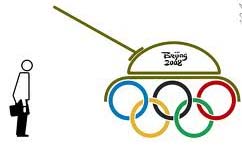 Despite talk of reform, the Bahrain Grand Prix and the Beijing Olympics proved to be catalysts for rights abuses. Mihir Bose asks whether human rights should be a criterion for hosting coveted international sporting events
Despite talk of reform, the Bahrain Grand Prix and the Beijing Olympics proved to be catalysts for rights abuses. Mihir Bose asks whether human rights should be a criterion for hosting coveted international sporting events
On the evening of 13 July 2001, as Beijing held a press conference in Moscow to celebrate securing the 2008 Olympics, they had an unexpected visitor: François Carrard, the Swiss lawyer who was executive director of the International Olympic Committee (IOC). Normally on such occasions the IOC keeps its distance and lets the victorious city have its moment in the sun. But Carrard felt he had to address the media on the human rights issue.
In the lead-up to the vote, Beijing’s rivals, in particular Toronto and Paris, had made much of China’s human rights record. As the members gathered, some 50 protesters assembled outside chanting “Free Tibet”. The Russian police, some wearing riot gear, broke up the protest and six people were seen being taken away in a waiting bus after demonstrators tried to unfurl three banners on the Moscow River embankment, opposite the World Trade Centre where the IOC was meeting. There were reports of 12 arrests.
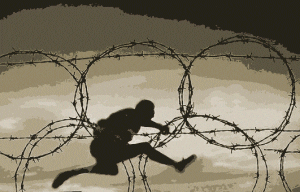 The IOC had so far refused to discuss human rights, arguing that it was only concerned with making a decision about sport. Nor was the issue addressed by the Evaluation Commission that visited the bid cities and whose assessment formed the basis of the IOC members’ decision. The report of the commission was crucial as, following the revelation of the 1998 Salt Lake City corruption scandal in which IOC members were accused of taking bribes, they were subsequently barred from visiting bid cities. Just before the vote for the 2008 Games, Hein Verbruggen, the Dutch chairman of the Evaluation Commission, summarised to his fellow members the various potential risk factors of the bidding cities. But he did not mention human rights.
The IOC had so far refused to discuss human rights, arguing that it was only concerned with making a decision about sport. Nor was the issue addressed by the Evaluation Commission that visited the bid cities and whose assessment formed the basis of the IOC members’ decision. The report of the commission was crucial as, following the revelation of the 1998 Salt Lake City corruption scandal in which IOC members were accused of taking bribes, they were subsequently barred from visiting bid cities. Just before the vote for the 2008 Games, Hein Verbruggen, the Dutch chairman of the Evaluation Commission, summarised to his fellow members the various potential risk factors of the bidding cities. But he did not mention human rights.
Beijing did face a question on human rights during its presentation. But this was delivered in such a roundabout way that only seasoned IOC observers could have understood it. Roland Baar, a rower from Germany, raised the ethical issue of playing beach volleyball in Tiananmen Square. Beijing had proposed this idea, but it had been shelved after objections from the Evaluation Commission that it was not a suitable venue. Baar was so circumspect that he did not even utter the words “Tiananmen Square”, lest it offend the Chinese.
But now Carrard felt free to talk about human rights. At the press conference, apologising profusely for intervening at the Chinese party, he revealed, “On human rights we had two choices — a decision we close the door and that is a hugely respectable decision. The other way is to bet on openness. We bet that in seven years’ time the interactions, the progress and the development will be such that human rights can be improved.”
Beijing Olympics: China’s coming-out party
Long before the Beijing Olympics was staged it was clear that this was an impossible bet, and in the end Jacque Rogge, who was elected president of the IOC a few days after the vote in Moscow, made it clear that it was no business of the committee to monitor China’s moral development. Indeed, Rogge confessed that the IOC neither had the power nor the ability to do anything on human rights. The result: China rode out the protests that accompanied the Games, in particular the ones that marked the torch relay. China, as it had always planned, used the Games to show they could take the Olympics, a western invention, and do it better. By the end of it, IOC members were applauding the Games as China’s giant coming-out party and declaring the bar had been raised to such an extent that other countries would struggle to match it. All talk of human rights and opening up the country had vanished.
The fact was that the Games went to Beijing not because the Olympic movement thought it could change China, but because of wider geopolitical considerations. The overwhelming view of IOC members was that the Games had to go to the most populous country in the world. China had been a good Olympic member. Whatever its human rights record, there was no Olympic reason to refuse the bid. There was also a fear that Beijing, having failed in 1993 when it lost to Sydney by two votes, might walk out of the Olympics if China did not succeed this time.
There was a dominant view in the Olympic movement that, with the collapse of the Soviet Union, a strong China was needed to balance the all-powerful Americans. Ivan Slavkov, the IOC member from Bulgaria — later expelled from the movement in 2005 when he was caught by an undercover reporter saying he would take bribes in exchange for votes — said at the time: “We need China to act as a check on the US. The US is the only superpower. It dominates everything, including the Olympics and the medal tables. China is coming up fast and, by giving the Games to them, we can make sure they develop in the right direction.”
The legacy of the 1936 Berlin Olympics
The IOC’s dance round the issue of human rights over the decades illustrates a wider problem for all sports organisations faced with such ethical concerns. The classic example of this was the 1936 Berlin Olympics. The award of the Games to Berlin was intended to symbolise the re-admission of a peaceful, democratic Germany to the family of nations after the horrors of the First World War. By a supreme irony, the Games have gone down in history as a triumph of Nazi propaganda. As the official Olympic-Zeitung proudly asked on 19 August 1936: “Do we have to point out that the great victor at the Olympic Games is Adolf Hitler?”
The 1936 Olympics, which left us the legacy of the torch relay, offers a template for the use of sport for ulterior purposes with its extraordinary mixture of opportunism, improvisation and attention to detail in the Nazi preparations for the Games. But Hitler could not have fulfilled his agenda to show how normal his regime was if leaders of international sport had not played into his hands, with their willingness to believe dishonest public assurances and to accept gestures and symbols rather than look at reality.
Since then, sports leaders have often looked the other way when major sporting events are held against a background of state violence, in countries whose repressive regimes seek to present themselves as open societies to the outside world. The list includes rebel South African cricket tours of the apartheid era, financed by tax concessions by the white regime, the 1968 Mexico Olympics, the Ali-Foreman fight in 1974 in a Zaire ruled by the brutal and corrupt despot Mobutu Sese Seko, and the 1978 World Cup in Argentina, organised by a junta which, even then, was embarking on a massive programme of killing people opposed to the regime.
Back in 1851, when Prince Albert wished to advertise the might of Queen Victoria’s realm he held a Great Exhibition — essentially a trade fair displaying the works of industry of all nations. There was culture in the form of Charlotte Bronte, Lewis Carroll and George Eliot, but no sport.
Sport, morality and character
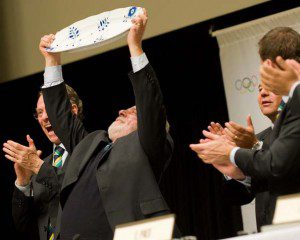 Today, sporting events have come to replace trade expos as a symbol of national success. Nelson Mandela used the power of sport, particularly rugby, to woo the whites, and felt that the rainbow nation had arrived when in 2010 it became the first African country to stage the football World Cup. In Copenhagen in 2009, President Lula of Brazil shed tears after Rio won the right to stage the 2016 Olympics. “Everybody talks of Brazil as the country of tomorrow,” he said. “Here in Copenhagen tomorrow has arrived.” His pleasure was all the greater as Rio had beaten Barack Obama’s Chicago, despite the fact that the most powerful man in the world made a personal plea to the IOC.
Today, sporting events have come to replace trade expos as a symbol of national success. Nelson Mandela used the power of sport, particularly rugby, to woo the whites, and felt that the rainbow nation had arrived when in 2010 it became the first African country to stage the football World Cup. In Copenhagen in 2009, President Lula of Brazil shed tears after Rio won the right to stage the 2016 Olympics. “Everybody talks of Brazil as the country of tomorrow,” he said. “Here in Copenhagen tomorrow has arrived.” His pleasure was all the greater as Rio had beaten Barack Obama’s Chicago, despite the fact that the most powerful man in the world made a personal plea to the IOC.
But the problem for sport is that, unlike expos, it carries a moral dimension. It is interesting to note that Beijing’s rivals made much of this distinction. Claude Bébéar, president of the Paris bid, made it clear he would have no problems with a Chinese city hosting an expo, but not the Olympics. Giving China the Games, he argued, would indicate moral approval for the regime.
The idea that sport had universal significance emerged only in the 19th century as the rules for modern sports were being formulated. In his fictional novel Tom Brown’s Schooldays, Thomas Hughes presented his headmaster at Rugby, Thomas Arnold, as a sporting guru. His message, said Hughes, was that sport could reach out beyond the playing fields more effectively than any other form of human activity. Indeed, sport could shape society for the greater good.
The headmaster of Hughes’s book was an invention — the real life Arnold had no interest in sport. But the idea proved so powerful that it seduced a French baron, Pierre de Coubertin, who came to Rugby to worship at Arnold’s shrine and used his principles to revive the Olympics, setting it a high political goal. As he put it:
It is clear the telegraph, railways, the telephone, the passionate research in science, congresses and exhibitions have done more for peace than any treaty or diplomatic convention. Well, I hope that athletics will do even more … let us export runners and fencers; there is a freetrade of the future, and on the day when it is introduced within the walls of old Europe the cause of peace would have received a new and mighty stay.
Modern sport is essentially the marriage of Hughes’s big idea in the private realm – that sport develops character — with Coubertin’s big idea in the public realm — that sport can transmit values within and between nations through regular international competition.
Bahrain and Formula One
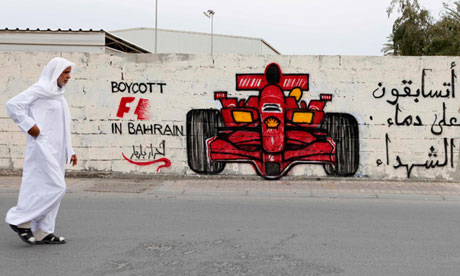
The problem arises when sport collides with political reality, as it did in the wake of the Arab spring. As millions rose up in the Arab world last year to challenge and even change their despotic rulers, in Bahrain the desire for freedom came into conflict with modern sport. In the picturesque words of the Daily Mail’s Martin Samuel, the result of “little brown people” wanting freedom meant “the next thing you know is there is one less place for rich white guys to race cars”.
Formula One’s first Grand Prix of the season was due to take place in Bahrain in March, just weeks after the kingdom had been engulfed by protesters demanding more freedom. There had been highly publicised protests at the main Pearl Roundabout in the financial district of Manama with some 31 protesters killed. Armoured cars, including Saudi troops and forces from Qatar and UAE, had rolled into the kingdom to restore order. How could a sports event take place in such a climate? And where was the moral compass of sport in even thinking it could?
The race was the dream of Crown Prince Sheikh Salman bin Hamad bin Isa al Khalifa, who had made it clear that money was no object in bringing one of the most high profile world events to his desert kingdom. The Bahrain government funded the race. The Sakhir circuit, where the Grand Prix had been run since 2004, had cost some £92m. The F1 organisers had been paid £24.6m to allow Bahrain to organise the opening race of the 2010 season, and this had risen by 60 per cent for the 2011 race. The protesters knew how dear the race was to the Crown Prince and that if they wanted to wring political concessions from him, they had to hit at his beloved sport.
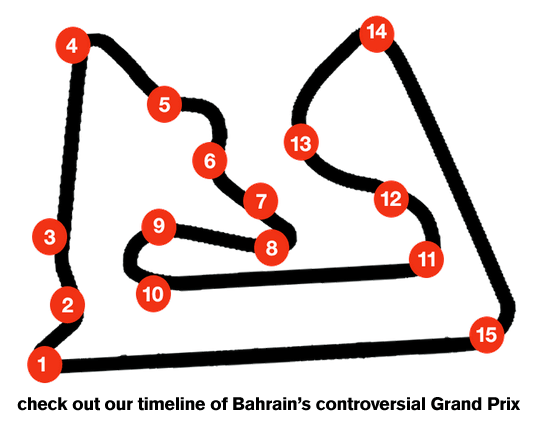 However, the F1 organisers of the race did not seem to understand the moral questions involved. Neither FIA, the governing body, nor Bernie Ecclestone — the F1 rights holder — wanted to put their heads above the parapet. Their reluctance, it was assumed, was due to the fear that if they cancelled the race they would stand to lose £37m in rights fees.
However, the F1 organisers of the race did not seem to understand the moral questions involved. Neither FIA, the governing body, nor Bernie Ecclestone — the F1 rights holder — wanted to put their heads above the parapet. Their reluctance, it was assumed, was due to the fear that if they cancelled the race they would stand to lose £37m in rights fees.
In the end, the Crown Prince himself decided the race had to be put back, hoping it could be held later in the year. His wish appeared to have been granted when, following an FIA inspection team visit, FIA’s World Council unanimously agreed that the Bahrain Grand Prix would now be held on 30 October. The decision provoked outrage from human rights activists and race fans. Many argued that for all the talk of high values, sport was more bothered about Mammon and ended up conspiring with despots.
The FIA’s judgement was further called into question when details of the inspection report emerged. Over a two-day trip, the FIA had met the minister of culture and tourism, the minister of the interior, had had lunch with the board that runs the Grand Prix, met circuit personnel and visited a shopping centre. But they had not met any of the dissidents. It was clear that the race could now not go ahead at the rescheduled date either. However, it was logistics not morality that was given as the reason for the cancellation. The new date for the race in October meant Bahrain would get India’s Grand Prix schedule – the new Formula One commercial centre – and extend the calendar into December. The teams just could not cope with the pressures this would create.
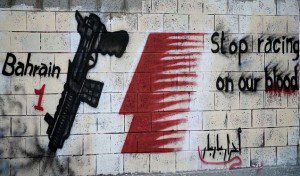 The whole affair brought little credit to Formula One, least of all the highly paid drivers. Apart from Red Bull’s Mark Webber, who acknowledged the moral question of sport taking place in the wake of a bloodbath, nearly all the other drivers avoided the moral issue. I could not even coax Britain’s most successful F1 driver, Nigel Mansell — who has chalked up 31 race wins and the 1992 world title — to take a stand on this issue. When I asked in the middle of the crisis whether it would be morally justified to stage the Bahrain Grand Prix, Mansell replied: “There are great people involved in Formula One who are in charge and it is up to them to speak to the power brokers of the country.”
The whole affair brought little credit to Formula One, least of all the highly paid drivers. Apart from Red Bull’s Mark Webber, who acknowledged the moral question of sport taking place in the wake of a bloodbath, nearly all the other drivers avoided the moral issue. I could not even coax Britain’s most successful F1 driver, Nigel Mansell — who has chalked up 31 race wins and the 1992 world title — to take a stand on this issue. When I asked in the middle of the crisis whether it would be morally justified to stage the Bahrain Grand Prix, Mansell replied: “There are great people involved in Formula One who are in charge and it is up to them to speak to the power brokers of the country.”
The problem here, as Max Mosley, the former head of FIA, astutely put it was:
The Formula One world did not seem to appreciate that the government in Bahrain was about to use the Grand Prix in support of suppressing human rights.
For all the moral high ground Formula One may like to claim, when faced with a stark ethical issue it is powerless and has to duck and dive. The same drama has played itself out again this year, with F1 facing international condemnation for holding the race in Bahrain.
Sports administrators may present themselves as the Vatican of sport, beyond the control of any authority but their own. Yet the money needed to run modern sport means they have to compromise with dubious governments and regimes. The result is that the high moral purpose of sport is sacrificed if not totally ignored. And until sport can deal with this basic contradiction, problems such as Bahrain will continue to appear. The worrying thing is that few in sport seem willing or able to deal with it.
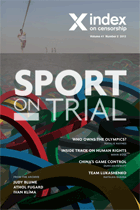 Mihir Bose is the author of The Spirit of the Game: How Sport Made the Modern World (Constable)
Mihir Bose is the author of The Spirit of the Game: How Sport Made the Modern World (Constable)
This article appears in the summer 2012 edition of Index on Censorship magazine. Click on
The Sports Issue for subscription options and more
![]() SUBSCRIBE NOW[/vc_column_text][/vc_column][vc_column width=”1/3″][vc_custom_heading text=”Listen”][vc_column_text]Index on Censorship magazine produces regular podcasts in which we speak to some of the most interesting writers, thinkers and activists around the globe.
SUBSCRIBE NOW[/vc_column_text][/vc_column][vc_column width=”1/3″][vc_custom_heading text=”Listen”][vc_column_text]Index on Censorship magazine produces regular podcasts in which we speak to some of the most interesting writers, thinkers and activists around the globe.








